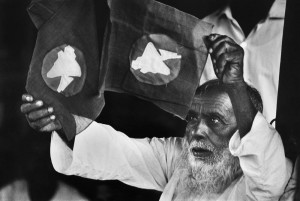It has been six years and Kabul has changed. My luggage was through booked from Bonn, via Munich and Dubai. Three flights in three different airlines with the tickets bought separately. Miraculously it arrived safely.
The banks at the airport were closed on Friday morning when I arrived. Maybe they?ll open tomorrow or the day after, they said. But things worked out. A SIM card was easy to get. It provided roaming Internet, but with a minimum charge for one month, I decided I?d stick to the Aina office where I was staying, for browsing. The SIM card man was going to change money for me as well. I suspected the rates weren?t the best, but at that stage, I wasn?t going to argue. More negotiations led to the bus to the parking lot and then the taxi.
The photographers at Aina had done well. The last time I?d seen Farzana Wahidy was at the All Roads Award Ceremony at National Geographic. I?d met Massoud Hossaini more recently at the World Press Award Ceremony in Amsterdam. He had just won the Pulitzer and it felt good to see how they?d progressed from the days I?d shared stories with the young and bright eyed youngsters in the grounds of Aina. But the office had moved. Luckily Farzana was able to direct the driver to the new location.
The new office was getting a fresh coat of paint and I made my way through stepladders to the TV room where the billiard table was stacked up with things temporarily relocated for the painters. But there were still people around and Aina looked like a busy place.
Farzana and Massoud soon came and we chatted about old times. I was to meet the other photographers on Sunday (today). That left me the rest of the day and Saturday to do other things. I had only seen the imported form of Buzkashi in Balochistan. But it was too hot for the sport in June and the other games were played early in the morning on Fridays, so I?d already missed them. But I did have other plans.
My main task was to identify work for a show I was curating for the Mus?e du quai Branly in Paris for 2013. Afghanistan was one of the eight countries I was covering. The trips to Nepal and Myanmar had gone well and I was looking forward to seeing fresh work from Afghanistan. I was also piggy backing for a story I was doing for Saudi Aramco World. Salma Hasan Ali, who was working with me on the story, had set up an appointment at what sounded like a wonderful school set up by Sadiqa Basiri Saleem.
I thought I?d also take pot luck in tracing an old friend. I?d met Aga Ghul in my last visit in 2006. Only then, I?d thought his name was Abdul Karim (my nonexistent Pashto and broken Urdu had obviously not served me well enough). The only clue I had was a photograph of Aga Ghul and his family, in their home and a vague landmark atop a hill. I didn?t know at that time, that I had the wrong name. We might well run this story on Saudi Aramco World, so I won?t give too much away at this stage. Anyway, there is plenty more to tell.
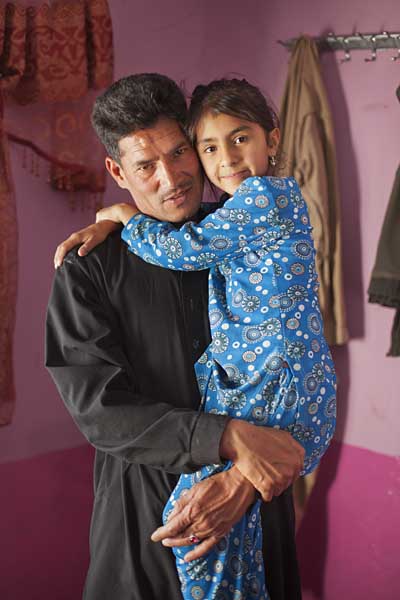
Continue reading “The spy who came in from Dhaka”
Tag: People
American Activists and the Birth of Bangladesh
Subscribe to ShahidulNews
Play in New Window |?Download
Forty years ago this month, the country of Bangladesh declared its independence from Pakistan. Then-President Richard Nixon supported Pakistan during the war because he wanted to prove the US would stand by an ally.
Many Americans disagreed with that stance. And when a ship headed for Pakistan with military equipment and ammunition was set to stop at a US port, one group of Americans felt it was necessary to get involved.
?I was ready to risk my life there,? says 78-year-old Richard Taylor. ?I just wanted to get in front of that ship.? Continue reading “American Activists and the Birth of Bangladesh”
Beautiful Bangladesh
Subscribe to ShahidulNews
![]()
Somewhat romanticised, particularly considering what?s been happening in the Chittagong Hill Tracts. But it is a beautiful country, despite the politicians. Thanks to my Pakistani friend Isa Daudpota for forwarding the clip.
We all helped suppress the Egyptians. So how do we change?
Subscribe to ShahidulNews
By Johann Hari
The Independent
Friday, 4 February 2011
Very few British people would beat up a poor person to get cheaper petrol. But our governments do it all the time. Why?
The old slogan from the 1960s has come true: the revolution has been televised. The world is watching the Bastille fall on 24/7 rolling news. An elderly thug is trying to buy and beat and tear-gas himself enough time to smuggle his family’s estimated $25bn in loot out of the country, and to install a successor friendly to his interests. The Egyptian people ? half of whom live on less than $2 a day ? seem determined to prevent the pillage and not to wait until September to drive out a dictator dripping in blood and bad hair dye.
The great Czech dissident Vaclav Havel outlined the “as if” principle. He said people trapped under a dictatorship need to act “as if they are free”. They need to act as if the dictator has no power over them. The Egyptians are trying ? and however many of them Mubarak murders on his way out the door, the direction in which fear flows has been successfully reversed. The tyrant has become terrified of “his” people.
Of course, there is a danger that what follows will be worse. My family lived for a time under the torturing tyranny of the Shah of Iran, and cheered the revolution in 1979. Yet he was replaced by the even more vicious Ayatollahs. But this is not the only model, nor the most likely. Events in Egypt look more like the Indonesian revolution, where in 1998 a popular uprising toppled a US-backed tyrant after 32 years of oppression ? and went on to build the largest and most plural democracy in the Muslim world.
But the discussion here in the West should focus on the factor we are responsible for and can influence ? the role our governments have played in suppressing the Egyptian people. Your taxes have been used to arm, fund and fuel this dictatorship. You have unwittingly helped to keep these people down. The tear-gas canisters fired at pro-democracy protesters have “Made in America” stamped on them, with British machine guns and grenade launchers held in the background.
Very few British people would praise a murderer and sell him weapons. Very few British people would beat up a poor person to get cheaper petrol. But our governments do it all the time. Why? British foreign policy does not follow the everyday moral principles of the British people, because it is not formulated by us. This might sound like an odd thing to say about a country that prides itself on being a democracy, but it is true.
The former Labour MP Lorna Fitzsimons spoke at a conference for Israel’s leaders last year and assured them they didn’t have to worry about the British people’s growing opposition to their policies because “public opinion does not influence foreign policy in Britain. Foreign policy is an elite issue”. This is repellent but right. It is formulated in the interests of big business and their demand for access to resources, and influential sectional interest groups.
You can see this most clearly if you go through the three reasons our governments give, sometimes publicly, sometimes privately, for their behavior in the Middle East. Explanation One: Oil. Some 60 per cent of the world’s remaining petrol is in the Middle East. We are all addicted to it, so our governments support strongmen and murderers who will keep the oil-taps gushing without interruption. Egypt doesn’t have oil, but it has crucial oil pipelines and supply routes, and it is part of a chain of regional dictators we don’t want broken in case they all fall taking the petrol pump with it. Addicts don’t stand up to their dealers: they fawn before them.
There is an obvious medium-term solution: break our addiction. The technology exists ? wind, wave and especially solar power ? to fuel our societies without oil. It would free us from our support for dictators and horrific wars of plunder like Iraq. It’s our society’s route to rehab ? but it is being blocked by the hugely influential oil companies, who would lose a fortune. Like everybody who needs to go to rehab, the first step is to come out of denial about why we are still hooked.
Explanation Two: Israel and the “peace process”. Over the past week, we have persistently been told that Mubarak was a key plank in supporting “peace in the Middle East”. The opposite is the truth. Mubarak has been at the forefront of waging war on the Palestinian population. There are 1.5 million people imprisoned on the Gaza Strip denied access to necessities like food and centrifuges for their blood transfusion service. They are being punished for voting “the wrong way” in a democratic election.
Israel blockades Gaza to one side, and Mubarak blockades it to the other. I’ve stood in Gaza and watched Egyptian soldiers refusing to let sick and dying people out for treatment they can’t get in Gaza’s collapsing hospitals. In return for this, Mubarak receives $1.5bn a year from the US. Far from contributing to peace, this is marinating the Gazan people in understandable hatred and dreams of vengeance. This is bad even for Israel herself ? but we are so servile to the demands of the country’s self-harming government, and to its loudest and angriest lobbyists here, that our governments obey.
Explanation Three: Strongmen suppress jihadism. Our governments claim that without dictators to suppress, torture and disappear Islamic fundamentalists, they will be unleashed and come after us. Indeed, they often outsourced torture to the Egyptian regime, sending suspects there to face things that would be illegal at home. Robert Baer, once a senior figure in black ops at the CIA, said: “If you want them to be tortured, you send them to Syria. If you want someone to disappear, you send them to Egypt.”
Western governments claim all this makes us safer. The opposite is the truth. In his acclaimed history of al-Qa’ida, The Looming Tower, Lawrence Wright explains: “America’s tragedy on September 11th was born in the prisons of Egypt.” Modern jihadism was invented by Sayeed Qutb as he was electrocuted and lashed in Egyptian jails and grew under successive tyrannies. Mohammed Atta, the lead 9/11 hijacker, was Egyptian, and named US backing for his country’s tyrant as one of the main reasons for the massacre.
When we fund the violent suppression of people, they hate us, and want to fight back. None of these factors that drove our governments to back Mubarak’s dictatorship in Egypt have changed. So we should strongly suspect they will now talk sweet words about democracy in public, and try to secure a more PR-friendly Mubarak in private.
It doesn’t have to be like this. We could make our governments as moral as we, the British people, are in our everyday lives. We could stop them trampling on the weak, and fattening thugs. But to achieve it, we have to democratise our own societies and claim control of our foreign policy. We would have to monitor and campaign over it, and let our governments know there is a price for behaving viciously abroad. The Egyptian people have shown this week they will risk everything to stop being abused. What will we risk to stop our governments being abusers?
http://www.independent.co.uk/opinion/commentators/johann-hari/johann-hari-we-all-helped-suppress-the-egyptians-so-how-do-we-change-2203579.html
Tracing Freedom
Subscribe to ShahidulNews
![]()
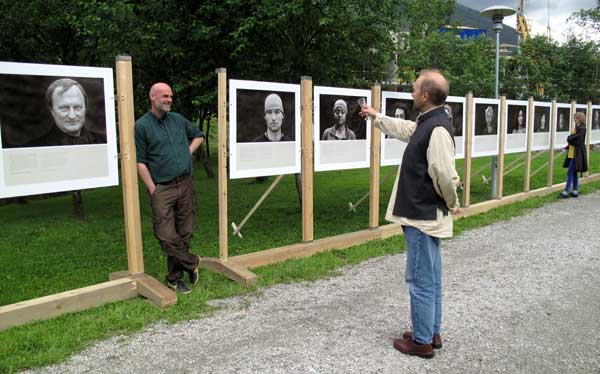
In late 2008 and early 2009 the Norwegian photographer Tom Hatlestad spent four months driving overland between Norway and Bangladesh. Along the way, he asked a hundred people to define freedom. Some of them are featured in this exhibition. Tom began dreaming of making an exhibition of photos and statements on perceptions of freedom after hearing that the theme for the 2009 Chobi Mela international festival of photography in Dhaka would be ?Freedom?.
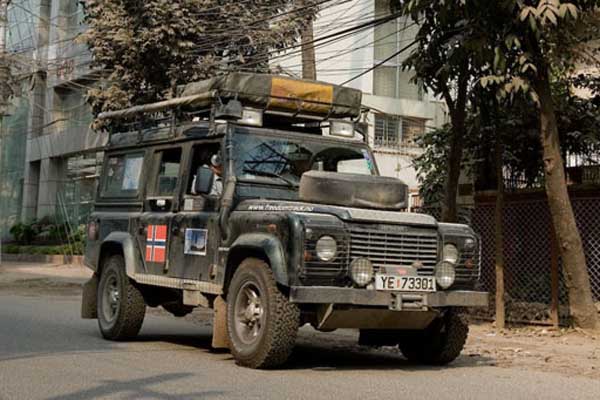
Freedom of movement – Tom has always loved to travel freely, and has visited some 50 countries to date. As a Norwegian citizen, he is also privileged in being able to travel to most places without problems. However, freedom of movement is actually less now than it was 50 years ago, mostly due to international politics and increasing levels of tension. With closed borders in Afghanistan, Syria, Iraq and Burma making the northern and southern routes impassable, Tom drove the only remaining overland route between Norway and Bangladesh: Sweden, Latvia, Lithuania, Poland, Slovakia, Hungary, Romania, Moldova, Bulgaria, Turkey, Iran, Pakistan, Nepal and India.
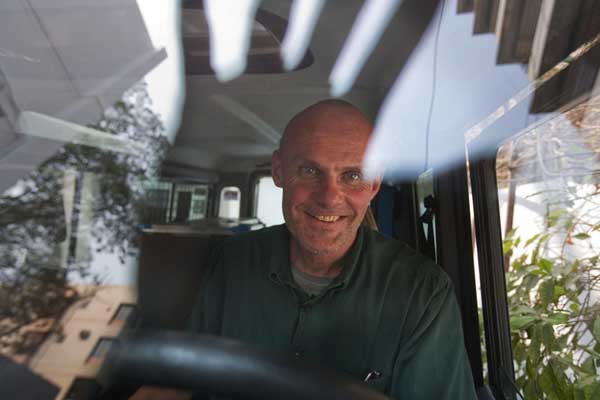
Freedom of thought – Driving ten hours daily for 102 days evokes a type of meditative state and a sense of freedom from domestic concerns. Tom?s Land Rover was not only a rolling studio with its own photo backdrop, but also a canvas for exploring his personal challenges on route. From its safety, he could differentiate real external barriers from those which were mostly in his head.
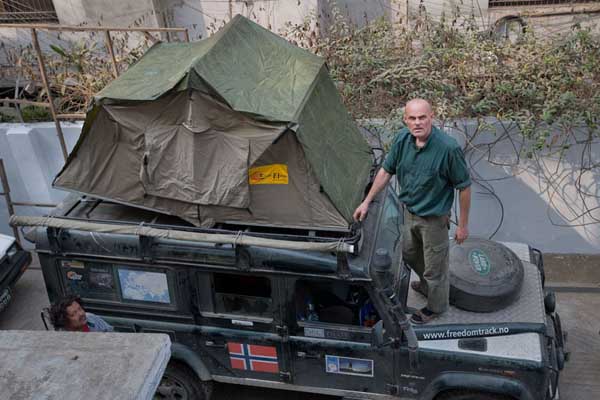
Freedom to congregate – Tom talked to people from around 30 different countries and from all walks of life and social standings. They include the head of the Lithuanian National Opera and Ballet, a world renowned violin maker, a Nobel Peace laureate, authors and activists. But it wasn?t easy to meet people of different ages, genders and nationalities ? in some countries women just aren?t allowed to talk to strangers, in others Tom?s passport was confiscated and he had to follow a military escort.
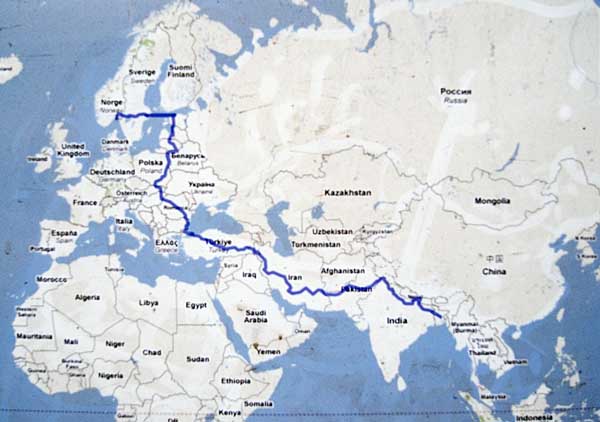
***
Tracing Freedom is a project in cooperation with the Nobel Peace Centre. Tom hopes that these portraits of freedom encourage you to reflect upon the freedom you experience in your own life, country and neighbourhood. Ultimately, he wants Tracing Freedom to help inspire a more open-minded and generous spirit in relation to our acceptance of other people?s attitudes.
***
Tom Hatlestad?s base is in Tj?me, Norway, from where he is currently planning his next Freedom Track journey. Tracing Freedom is supported by H?yanger N?ringsutvikling, Sparebanken Sogn og Fjordane and Fond for Lyd og Bilde.
Scroll down this link to see a description of Tom’s trip to Bangladesh
When the Waters Came
![]()
It was nearly twenty years ago when I had written this. After one of my first photojournalistic assignments:
What does one photograph to depict a flood? A submerged house, a boat on a highway, people wading in water?
As we boated through the branches in Jinjira we found a wicker basket in a tree. The family had long since abandoned their home, and their worldly belongings, gathered in that basket, waited patiently for their homecoming.

Wicker basket in tree. Jinjira. 2nd September 1988. Dhaka Bangladesh. ? Shahidul Alam/Drik/MajorityWorld
The worst flood in a hundred years? That statistic is hardly relevant. They, as those before them and after them will always face the floods. How does it matter whether they are 60% starved or 75% starved? How does it matter what country the relief wheat comes from? They themselves are mere statistics to power hungry politicians.

The family still needed to be fed. When I went back the next day to this place in Jinjira, the water had risen another three feet. I never saw her again. 2nd September 1988. Dhaka Bangladesh. ? Shahidul Alam/Drik/MajorityWorld
What is relevant are the feelings that have been kindled, that half kilogram of rice that has been shared, that solitary dry house that has warmly welcomed all who have needed the shelter. That others have shared the pain.
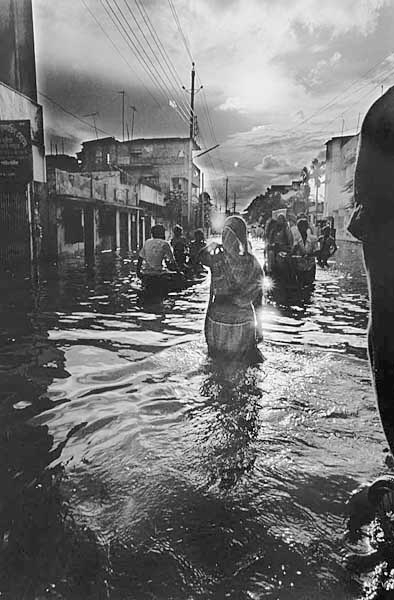
Wading down a street near Kamlapur railway station. “Dreamland Photographers”, the local studio, was still open for business. 2nd September 1988. Dhaka Bangladesh. ? Shahidul Alam/Drik/MajorityWorld
What is relevant is that now the roads are dry and the walls repainted and that a nation that once so cared has so quickly forgotten.
I look back and merely feel the ineffectuality of my images.
Shahidul Alam
Dhaka 1988
Nearly twenty years on, the floods are with us again. They are a part of our natural agricultural cycle. They irrigate the land, replenish the topsoil, remove the toxins. But deforestation in the mountains, illegal constructions, ill planned roads and ill caring leaders make floods take on a violent form. The waters get angry.
This year, when the waters had risen, our adviser advised that it was not yet a calamity. When the waters reached danger levels, the decree came that because of the state of emergency, ‘[political] banners were banned’ so while people struggled for food and shelter, banner rights became the issue. Now as the waters engulf the land and people flounder in need of relief, our adviser advises us ?we don?t have to help the people, they?re going to their relative?s house by themselves?.
Now that is a solution Bangladesh can offer to all the distressed people in the world. Just go find a relative.
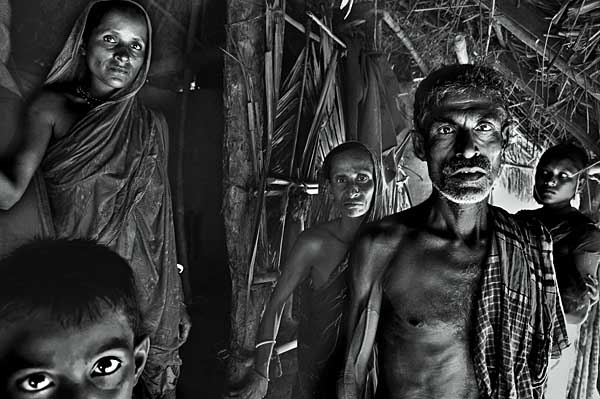
Before the floods. People affected by cyclone Akash. Mohishshoiri River. Khulna. 21 May 2007. ? Tanvir Ahmed/DrikNews
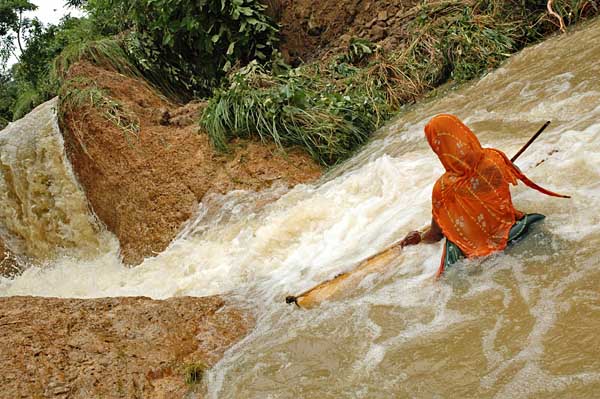
Woman fishes in the flood waters. 13 June 2007. Comilla Bangladesh. Kalim Shantu/DrikNews
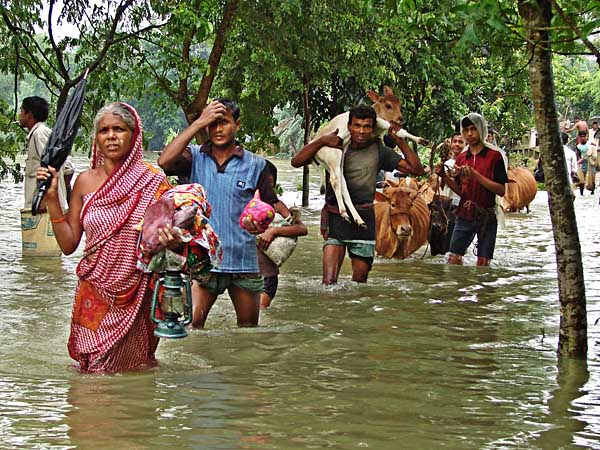
Twenty villages had been affected at the junction of the rivers Ghagot, Brahmaputra and Teesta making numerous people homeless. 31 July 2007. Gaibandha. Bangladesh ? Quddus Alam/DrikNews
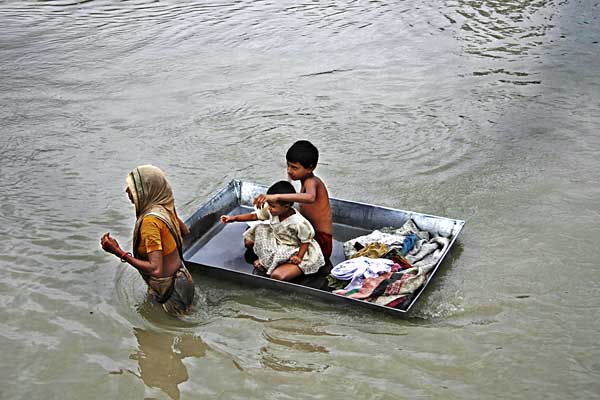
Woman in search of dry land. 30 July 2007. Sirajgonj Bangladesh ? Tanvir Ahmed/DrikNews
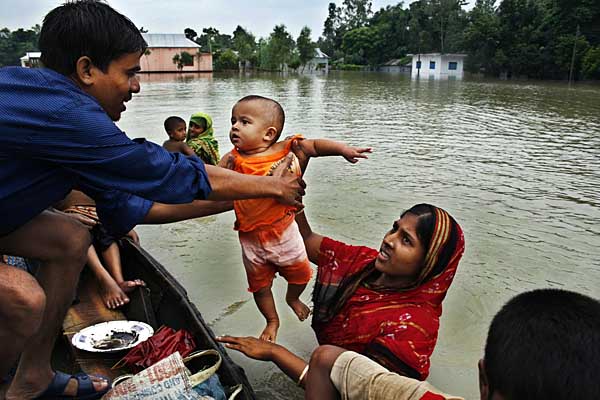
Villagers rescuing mother and child. 30 July 2007. Sirajgonj Bangladesh ? Tanvir Ahmed/DrikNews
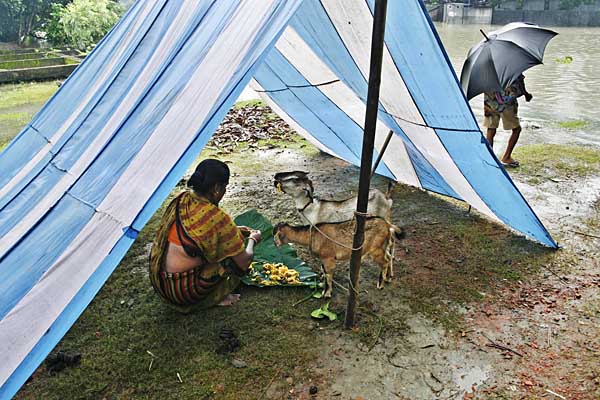
Woman feeding goats in makeshift tent. 30 July 2007. Sirajgonj Bangladesh ? Tanvir Ahmed/DrikNews
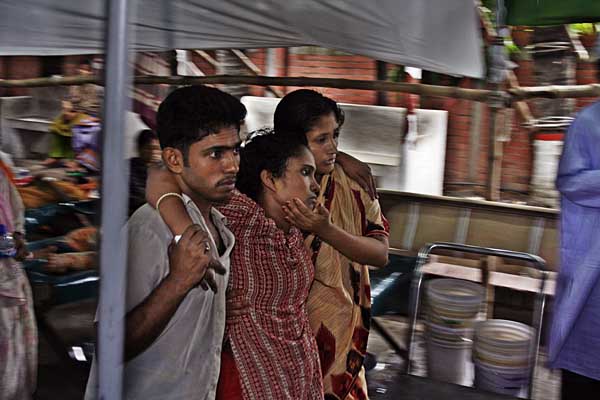
Diarrheal patients at hospital in Dhaka. 11 August 2007. Dhaka Bangladesh ? Munir uz Zaman/DrikNews
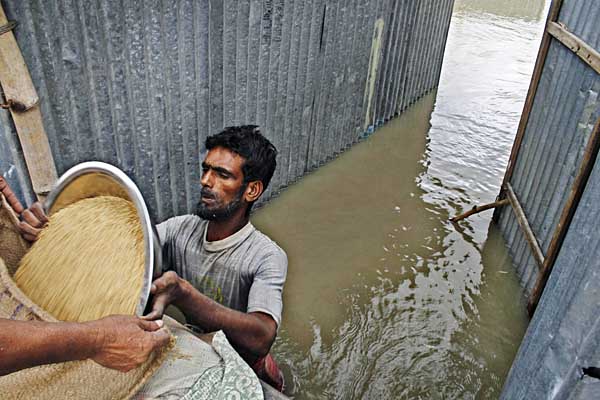
Spontaneous relief operations organised by citizen groups. 30 July 2007. Sirajgonj Bangladesh ? Tanvir Ahmed/DrikNews
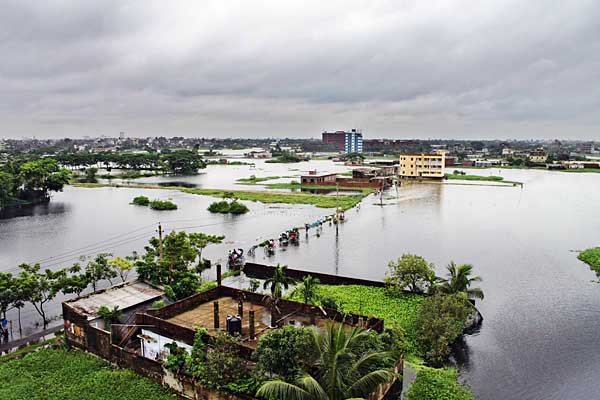
While one third of the country was flooded, people inside the DND (Dhaka Narayanganj Demra) embankment faced the stagnant water cause by rains. 25 July. Narayanganj Bangladesh ? Tanvir Ahmed/DrikNews
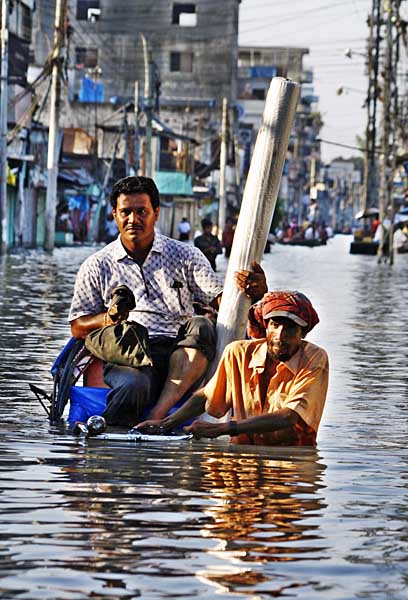
700,000 people were marooned in Sirajgonj. 64 people had already died when this photograph was taken. 5 August 2007. Sirajgonj Bangladesh ? Tanvir Ahmed/DrikNews
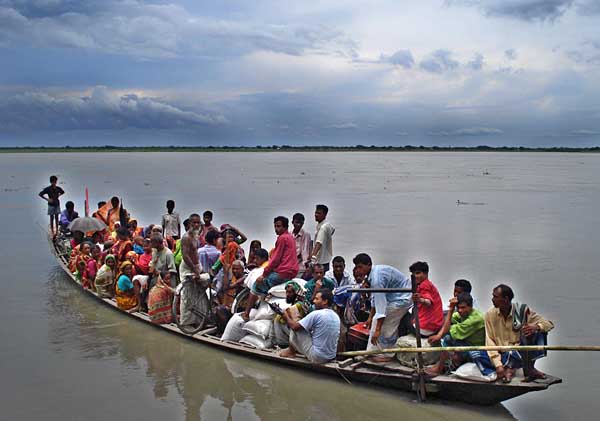
Boats are the only means of communication during floods. July 2 2007. Rangpur, Bangladesh. ? Ador Rahman/DrikNews
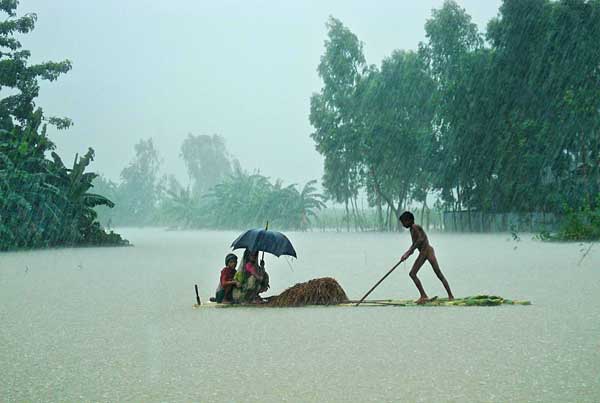
A family looks for shelter using a raft made of banana trees. 31 July 2007. Gaibandha Bangladesh ? Quddus Alam/DrikNews
And across the border, viewed from afar:
The Rains Reach Kolkata
When I was just a little boy, I watched the clouds advance
From rooftop high above the streets and bustle of Calcutta.
Up there, I watched the hawks soar high, and saw the palm fronds’ dance,
In wind that blew before the storm, and banged each window shutter.
It was in June, when summer’s heat had risen to its height,
That clouds approached, as though for war, advancing in a line,
Their heads held high, dark wall beneath — a fear-instilling sight,
With lightning streaks, and thunder-growls of warriors divine.
The sparrows, crows and pigeons fled, in haste to get away
And find refuge, as dust was blown from streets by gusts so strong
That palm trees bent, and tossed their heads, and back and forth did sway,
As leaves and clothes, and sailing fronds, with birds were swept along.
Then from the heat, we knew respite, as cool winds did descend
>From belly of the thunderhead, which bore a mist so fine,
With ions, whose electric charge did minds and bodies mend
And lift from summer somnolence like clear celestial wine.
And I would run and scramble down, from perch on highest roof,
To shelter in a doorway, where I still could watch the storm
Without myself being blown away, or struck by lightning hoof,
As racing clouds obscured the sky, like wraiths in equine form.
And then the dark, the greenish gloom, the flash more bright than sun,
The crack so loud it seemed the earth was cloven by the sky,
And pelting rain in slanting sheets, like bullets from a gun,
On roofs of tin, and wooden shades, and roll of thunder high!
And so the chariots of the gods would roll by overhead,
And we could hear the neighs and roars, and see the sparks that flew
As titans battled in the skies, by trumpet blowers led,
And sword of land pierced mail of sea, and blood of rain then drew.
And all the kids would venture out, unheeding of the scolds,
To jump with glee and leap and splash, in dance as old as time,
And yet as freshly bold that day, as in the eons old,
When sea would come to land to fight, and mate, in yearly rhyme.
Babui / Arjun Janah*
2007 August 11th, Sat.
Berkeley, California
*Arjun has an identity of his own, but for us photographers, he is the son of the legendary Indian photographer Sunil Janah.
Sitting on a man’s back
![]()
Three bombs had gone off the day before, and they weren’t comfortable about me walking on my own in the streets of Kabul.
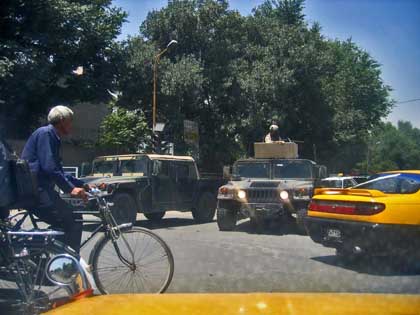
The driver insisted that he gave me a lift. The suggestion that a particular hill not too far away would give me a good view of the city was a good one, and the late evening light was just leaking through the haze. He offered to stay to give me a lift back, but I wanted to be on my own, and writing down that I needed to get back to Choroi Malek Asghar, I wandered off, free at last. Coming down the hill, I wandered through the back streets as I tend to do in cities I am new to. An odd conversation in my broken Urdu helped. As always kids wanted to be photographed, and wherever I went, people offered me cups of tea, or invited me home.
Abdul Karim latched on to me. Insisting that I visit his family, he took me through the narrow winding mud path that led to the tiny doorway that was the entrance to his home. My first task was to take photographs of the family. I had none of the language skills he had, but it didn’t seem to matter. Initially surprised by this stranger the man had brought home, the family quickly turned to more important things, like being hospitable to this mehman (guest).
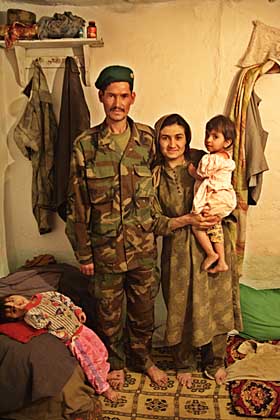
I gesticulated wildly enough to convince them that I needed to catch the light while it was there, and Abdul Karim became my self appointed guide. I could go and take some photographs, but was to come back and have tea. The sun had almost set by the time we were back up the hill. A lone runner ran circles around the flattened top of the hillock. Football fever had set in and the shouting of the kids chasing a ball in the dried up swimming pool in the centre, carried through the evening sky. Four young men came up and made conversation. Two of them had been to Pakistan, and we spoke in Urdu and in English. One was an out of work webmaster, and wanted my email address. They posed, I photographed, and he scribbled his email address so I could email the picture back.
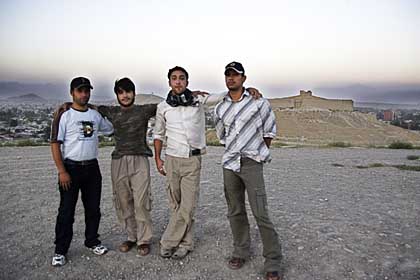
The sun had set and Abdul Karim wanted me to keep my end of the bargain. The young men also wanted me to visit their homes. Perhaps they could take me out the following day they suggested. They knew great places for photography. We exchanged mobile phone numbers. Undiplomatically, I suggested that perhaps they too could come to Abdul Karim?s and then I could go with them to their homes. One young man took me aside and explained that they couldn’t go. It would be breaking purdah. I wondered how I had become an exception to the rule.
Abdul Karim, his mother, Bibi Shirin, his wife Ayesha, and their two children Mehjebeen and Sufia lived in this one room flat. There were mattresses on the floor and one television set and one radio. There was a tiny courtyard and metal steps that went up to what looked like a loft. Abdul Karim had worked as an engineer in the marines and was now out of a job. He showed me the children’s book he used, to try and teach himself English. Even with body language and the best of intentions, our communication faltered, but there was no mistaking that I was a welcome guest, and my major challenge that evening was leaving without having dinner with the family. The path outside was by now pitch black, and Abdul Karim walked me through the maze and got me to a cab. We parted with some sadness.
Back at the Aina office where I was staying, the guard with the Kalashnikov welcomed me with a smile. I could see why my colleague Nazrul hadn’t left the compound for the last two months.
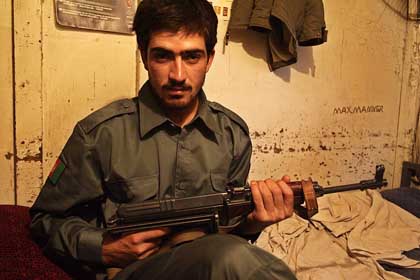
Day before yesterday we drove up to Salang, past the bombed out ruins of what had been thriving villages, past the tank carcasses, past vast stretches of barren land, interspersed with lush foliage by the river beds. A young man took great pleasure in racing his steed against our minivan. Two boys flagged me down, insisting that their friendship be recorded in my camera.
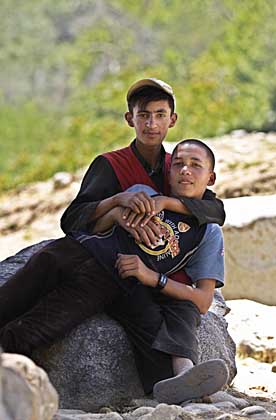
Back in Kabul, I did walk out on my own, without an escort, and went to the marketplace. The men in the bakery insisted that I try their freshly baked bread and I briefly sat with new found friends and watched Hindi films in the restaurants.
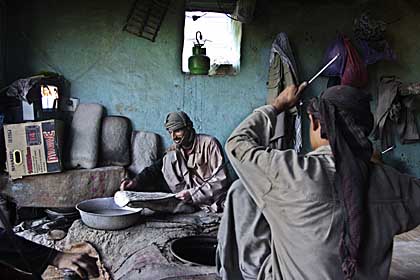
I spoke to Arif who ran a small studio, and came across the out of work labourers in the market square looking for work. A child and an old man reached into the gutter to pick up a polythene bag they could sell. It was in a worker’s face that I realized why people who are capable of so much hospitality, and are so willing to give, have become objects of terror to the foreigners who live here.
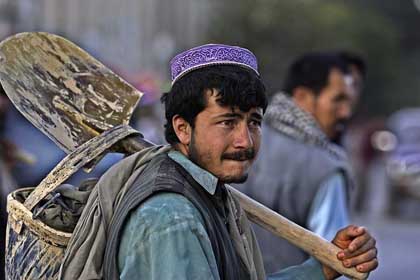
They want the very things that the west has officially championed. Jobs, security, a home for their families and for their land to be free of occupation.
Organisers at the Sarina Hotel claimed it was the first fashion show in 20 years in Afghanistan. There were few tell tale signs of the riots that had taken place here a few days ago. But the white Land Rovers outside, four sets of security barriers, and the armed US soldiers on guard, marked the distance between central Kabul and the rest of the country.
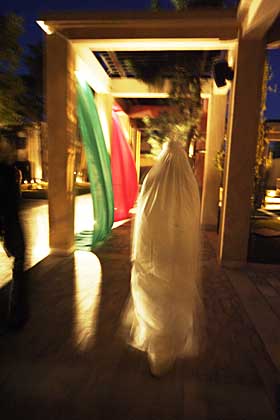
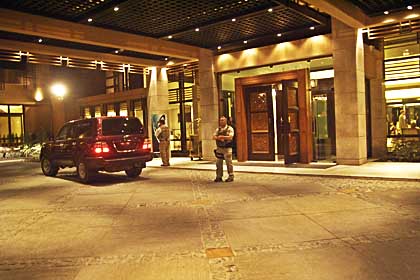
I remember Tolstoy’s words “I sit on a man’s back, choking him, and making him carry me, and yet assure myself and others that I am very sorry for him and wish to ease his lot by any means possible, except getting off his back.” They seem to have learned little in 120 years.
Choroi Malek Asghar
Kabul
9th July 2006
The First Element
Subscribe to ShahidulNews
![]()
Poem on Waterwall at exhibition “The First Element” at the National Art Gallery Malaysia.
Water
Fluid, flowing, feeling, water
Life, death, birth, union, water
Meandering, shaping, eroding, changing, water
Cosmos, clouds of gas, the ice age, frozen seas, water
Drips
Waving, trickling, surging, swaying, water
Giving, creating, forming, bleeding, water
Emotions, passion, unbridled, desire, water
Decanting, oozing, seeping, leaking, leeching, water
Drops
Wanting, longing, aching, waiting, water
Spraying, spurting, frothing, spewing, water
Coalescing, merging, blending, easing, water
Searching, probing, seeking, beseeching, water
Damp
Dank, fog, mist, wistful water
Soaked in tears
Bathed in rain
Drenched in joy
Cleansed in pain
Immersed in womb
The first element
Water
Shahidul Alam
Mon Nov 10, 2003
Brahmaputra Diary
Subscribe to ShahidulNews
Multimedia version with video and photographs
A gentle trickle
A surging river
A gentle plain
A delta
Four long years
Three thousand kilometres
Cormorants, sea gulls
Sparrows at dusk
A flurry of wings
Moody clouds
La brume matinale
Boats bathed in twilight red
Wild blossoms
In narrow paths
A banyan tree
Tall strong shady
A forlorn reed
In amber garb
Bamboo groves
Reaching for the sky
Arching along the water
Coconut palms
Betwixt the land and the sea
A river rests, a delta speaks
Older than the mountains, it is a river that forces its way across the towering Himalayas. The Tibetans know it as the Yarlung Tsang Po (the purifier). In India it is known as the Brahmaputra. In Bangladesh it is also known as the Jamuna, the Padma and finally the Meghna before it opens into the sea. No one is known to have traversed the entire run of the river. We take you on this journey, across the millenium, across three nations, through Buddhism, Hinduism and Islam. From the icy trickle in the glaciers. Along Pei in China, where the river narrows into a rapid-filled gorge reaching phenomenal depths and amazing cascades. Through the crystal clear waters in Arunachal Pradesh. Across the We take you sailing along the Brahmaputra.
The Brahmaputra Diary. An exhibition based on my journey along this majestic Asian river opens at the Sutra Gallery in Kuala Lumpur tonight (Sunday the 7th September) at 8:00 pm.
Shahidul Alam
Sun Sep 7, 2003
Multimedia version with video in Zonezero.com
Changing their destiny
Subscribe to ShahidulNews
www.newint.org/issue287/contents.html
Letter from Bangladesh
Changing their destiny
Shahidul Alam travels with the poor who chase a dream to distant lands.
They all have numbers. Jeans tucked into their high-ankled sneakers. They strut through the airport lounge, moving en masse. We work our way up the corridors leading to the airplane, but many stop just before boarding. The cocky gait has gone. The sad faces look out longingly at the small figures silhouetted on the rooftops. They wave and they wave and they wave. The stewardess has seen it all before and rounds them up, herding them into the aircraft. One by one they disengage themselves, probably realizing for the first time just what they are leaving behind.

As in the case of the others, his had been no ordinary farewell. They had all come from the village to see him off. Last night, as they slept outside the exclusive passenger lounge, they had prayed together. Abdul Malek has few illusions. He realizes that on $110 a month, for 18 months, there is no way he can save enough to replace the money that his family has invested.
But he sees it differently. No-one from his village has ever been abroad. His sisters would get married. His mother would have her roof repaired, and he would be able to find work for others from the village. This trip is not for him alone. His whole family, even his whole village, are going to change their destiny.
That single hope, to change one’s destiny, is what ties all migrants together ? whether they be the Bangladeshis who work in the forests of Malaysia, those like Abdul Malek, who work as unskilled labour in the Middle East, or those that go to the promised lands of the US. Not all of them are poor. Many are skilled and well educated. Still, the possibility of changing one’s destiny is the single driving force that pushes people into precarious journeys all across the globe. They see it not merely as a means for economic freedom, but also as a means for social mobility.
In the 25 years since independence the middle class in Bangladesh has prospered, and many of its members have climbed the social ladder. But except for a very few rags-to-riches stories, the poor have been well and truly entrenched in poverty. They see little hope of ever being able to claw their way out of it, except perhaps through the promise of distant lands.
So it is that hundreds of workers mill around the Kuwait Embassy in Gulshan, the posh part of Dhaka where the wealthy Bangladeshis and the foreigners live. Kuwait has begun recruiting again after the hiatus caused by the Gulf War, and for the many Bangladeshis who left during the War, and those who have been waiting in the wings, the arduous struggle is beginning. False passports, employment agents, attempts to bribe immigration officials, the long uncertain wait.
Some wait outside the office of ‘Prince Musa’ in Banani. He is king of the agents. His secretary shows me the giant portraits taken with ‘coloured gels’, in an early Hollywood style. She carefully searches for the admiration in my eyes she has known to expect in others. She brings out the press cuttings: the glowing tributes paid by Forbes, the US magazine for and about the wealthy, the stories of his associations with the jet set. She talks of the culture of the man, his sense of style, his private jet, his place in the world of fashion.
Apart from the sensational eight-million-dollar donation to the British Labour Party in 1994 ? which Labour denies, but which the ‘Prince’ insists was accepted ? there are other stories. Some of these I can verify, like the rosewater used for his bath, and the diamond pendants on his shoes (reportedly worth three million dollars). Others, like his friendship with the Sultan of Brunei, the Saudi Royals and leading Western politicians, are attested to by photographs in family albums.
He was once a young man from a small town in Faridpur, not too distant from Abdul Malek’s home or economic position, who made good. Whether the wealth of the ‘Prince’ derives mainly from commissions paid by thousands of Maleks all over Bangladesh or whether, as many assume, it is from lucrative arms deals, the incongruity of it all remains: the fabulously wealthy are earning from the poorest of the poor.
Whereas the ‘Prince’ has emigrated to the city and saves most of his money abroad, Malek and his friends save every penny and send it to the local bank in their village. Malek is different from the many Bengalis who emigrated to the West after World War Two, when immigration was easier and naturalization laws allowed people to settle. Malek, like his friends, has no illusions about ‘settling’ overseas. He knows only too well his status amongst those who know him only as cheap labour. Bangladesh is clearly, irrevocably, his home. He merely wants a better life for himself than the Bangladeshi princes have reserved for him.
An old friend of the NI, Shahidul Alam is guiding light of Drik, a remarkable photographic agency in Dhaka.

